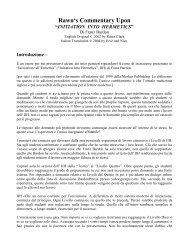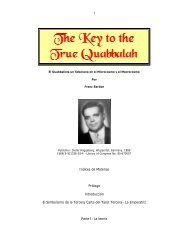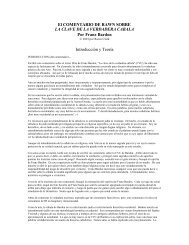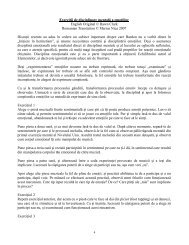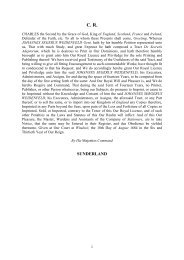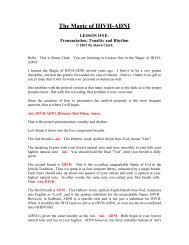Hermetic Philosophy and Alchemy - A Bardon Companion
Hermetic Philosophy and Alchemy - A Bardon Companion
Hermetic Philosophy and Alchemy - A Bardon Companion
Create successful ePaper yourself
Turn your PDF publications into a flip-book with our unique Google optimized e-Paper software.
And this would seem to be the true ground of metalline transmutation, <strong>and</strong> of every other; namely, the<br />
homogeneity of the radical substance of things; <strong>and</strong> on the alleged fact that metals, minerals, <strong>and</strong> all<br />
diversified natures, being of the same created first principles, may be reduced into their common basis<br />
or mercurial first matter, the whole <strong>Hermetic</strong> doctrine appears to hinge <strong>and</strong> proceed.<br />
The multiform body of the world lies open, but the source everywhere is occult; nor does ordinary<br />
analysis at all discover this Universal Matter of the adepts. It has been accordingly objected, that<br />
natural species cannot be transmutable, because the transmutation of different species one into another<br />
necessarily implies mixtion <strong>and</strong> a spurious offspring: thus, that if it were even admitted possible by<br />
any means to infuse gold into lead or other inferior form, it would still remain imperfect, <strong>and</strong> the better<br />
species be defiled by the vile admixture; that the result would not in fact be gold at all, but of a middle<br />
nature, according to the proportionate virtue of the metals conjoining, golden or leaden, or as the case<br />
might be. Since species are indestructible, therefore, the transmutation of metals has been regarded as<br />
a sophistical proposition <strong>and</strong> not a true art.<br />
And this argument the alchemists also admitting, have sometimes seemed to contradict themselves <strong>and</strong><br />
their science; but such is not really the case <strong>and</strong> only from want of underst<strong>and</strong>ing them has it been<br />
supposed so. It is not species that they profess to transmute; nor do they ever teach in theory that lead<br />
as lead, or mercury as mercury specificate, can be changed into gold, any more than a dog into a horse;<br />
a tulip into a daisy, or vice versa, in this way, anything of unlike kind; but it is the subject-matter of<br />
these metals, the radical moisture of which they are uniformly composed, that they say may be<br />
withdrawn by art <strong>and</strong> transported from inferior Forms, being set free by the force of a superior ferment<br />
or attraction.<br />
Species, says Friar Bacon, are not transmuted, but their subject-matter rather, Species non<br />
transmutantur, sed subjecta specierum optime et propriisime: --- therefore the first work is to reduce<br />
the body into water, that is, into mercury, <strong>and</strong> this is called Solution, which is the foundation of the<br />
whole art (1). And the first preparation <strong>and</strong> foundation of the <strong>Hermetic</strong> art, says the author of the<br />
Rosarium, is Solution <strong>and</strong> a reduction of the body into water, which is argent vive: for it is well known<br />
to artists that species cannot, as themselves, be transmuted, since they are not liable to sensible action<br />
<strong>and</strong> corruption; but the Subjects of species rather, since they are corruptible <strong>and</strong> may be changed; yet<br />
neither can the Subjects of species be transmuted, unless they are reduced first into their first matter,<br />
<strong>and</strong> made free to pass from one into another form. But this is not contrary to reason, because one form<br />
being expelled, another may be introduced, as is evident in rustic operations --- as in the making of<br />
glass from flints, stones <strong>and</strong> ashes: much more then should the experienced philosopher be able to<br />
corrupt the Subject-matter of natures <strong>and</strong> to introduce a new Form (2). Arnold, also admitting that<br />
species are indestructible, advises therefore that the Subject be freed by an artificial reduction (3).<br />
Species non transmutari sed individual specierum (4). And Avicenna (5), <strong>and</strong> Aristotle (6), who is also<br />
quoted from by Ripley.<br />
As the Philosopher who in the Book of Meteors did wryte,<br />
That the likeness of bodyes metallyne be not transmutable.<br />
But afterwards he added theis words of more delyte,<br />
Without they be reduced to their beginning materiable;<br />
Wherefore such bodies as in nature be liquable<br />
Mineral <strong>and</strong> metalline may be mercurizate,<br />
Conceive ye may theis science is not opinable,<br />
But very true by Raymond <strong>and</strong> others determinate (7).<br />
When therefore Lully, speaking of the Art, declares tha species are absolute <strong>and</strong> cannot be changed<br />
one into another, --- Elementiva habent vera conditiones et una species se non transmutet in aliam (8),<br />
--- We shall not underst<strong>and</strong> him as denying the art by any means, but a false position of it only; the<br />
fundamental possibility <strong>and</strong> principle of transmutation being not of species, but of their Universal<br />
Subject or first matter.



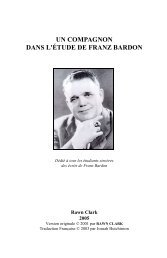
![Magie de YHVH-ADNY et Archeus[1]](https://img.yumpu.com/16926522/1/190x245/magie-de-yhvh-adny-et-archeus1.jpg?quality=85)
